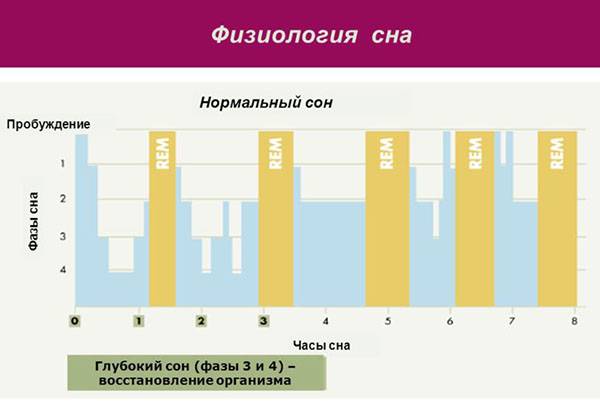How many hours does it take to sleep well?
Content:
A good full sleep is very important for the health of every person; it is not without reason that a whole branch of medicine, somnology, deals with sleep problems. Scientists have long found the answer to the question of how much sleep you need to get enough sleep and provide your body with an energy boost for the whole day. After all, a sleepy person is annoyed and absent-minded, unable to study or perform usual daily work, all his thoughts are connected with one desire - to sleep. Lack of sleep threatens to exacerbate existing diseases and the emergence of new serious ailments up to a decrease in immunity, the development of depression and insomnia. The number of hours needed for sleep depends on age and gender, the specifics of work and the degree of mental stress. The main thing is that the duration of sleep fully meets the needs of the body.
The Importance of Sleep
Healthy sleep is a source of good health and good mood. Providing the brain a good rest, you can permanently preserve youth and beauty, which is sometimes so difficult to achieve with the help of cosmetics. During sleep, a person forgets about pressing problems and is carried away in dreams into the fairy-tale world of illusions.
It is continuous and sound sleep that is so important for the body. If a person cannot fall asleep without sleeping pills, his rest is anxious, and his brain is not relaxed enough, then the next day he will feel overwhelmed and tired, and there can be no talk of the benefits of such a rest. Even irregularly taking sleeping pills, you can soon get insomnia, which you can’t get rid of without the help of a doctor.
Scientists have found that sleep for humans is much more important than food. Indeed, without a good rest it is difficult to hold out for more than two days. A sleepy worker can fall asleep right at the machine at the most inopportune moment or doze off on a desk. It is especially important for a driver to go on a long journey, as his lack of sleep threatens to turn into a disaster.
In order for night rest to bring maximum benefits, you must try to observe the phases of sleep and wakefulness, go to bed and get up on time, and create favorable conditions in the bedroom.
Sleep phases
A person's sleep can be slow and fast, with the stages being repeated several times during the night. With the onset of a new phase, a certain part of the brain is activated, and the part that worked now rests.
Slow sleep is divided into several stages.
- Half asleep, nap. It is characterized by a decrease in muscle activity, a decrease in the number of heart beats, and a decrease in body temperature.
- Shallow. The process of slowing down the work of muscles and the heart continues.
- Slow. The body is completely relaxed and begins to regain strength.
- Deep slow. All body systems are completely relaxed, the body rests and recovers.
Thanks to the last two stages, the awakened person feels completely rested.
REM sleep for the first time occurs 90 minutes after falling asleep. Despite the complete relaxation of the muscles, the activity of brain cells during the course of this phase is the same as during human wakefulness. The body temperature is increased, the pulse is quickened, the eyes under the eyelids move quickly. Having entered the stage of REM sleep, a person begins to dream.
With the help of scientific research, it was proved that night rest should consist of five cycles, in each of which 85% of the time is devoted to slow sleep and 15% to fast. All phases are interconnected and necessary to restore the brain activity of the body.
How much sleep to sleep?
Today, in the age of rapid speeds, when any delay in “death is like”, people are more and more interested in the question of how many hours should be spent on rest in order to fully restore strength and not spend too much precious time. Material about the duration of sleep was collected by the author of the site purityis.decorexpro.com/en/.
Somnologists argue that for a full night's rest, five continuous cycles of changing the slow and fast phases are enough.
Important!
The length of the cycle is about 90 minutes - which means that sleep should last at least 7-8 hours.
If a person goes to bed at ten in the evening, then in the morning he should wake up at about six. These figures are approximate values and for each individual person are purely individual. History knows people who could sleep only three hours a day and at the same time did an excellent job with their duties. But this is an exception, and it is very difficult for an ordinary person to do without 6-8 hours of continuous sleep.
The following factors affect the duration of sleep.
- Floor. Women should sleep 30-50 minutes longer than men. Scientists explain this with features in the work of the nervous system in women.
- Age. It has long been known that the smaller the person’s age, the more he sleeps. So, a baby in total can oversleep more than 16 hours a day, and an elderly person needs only 5-7 hours.
- Food. The composition of the food affects the duration of sleep and the speed of falling asleep. If a person prefers dishes with a small percentage of fat content, then he falls asleep easier, and sleeps harder.
- Physical exercise. A person who performs hard physical work in the fresh air during the day will fall asleep without difficulty and sleep for 8-10 hours without a break.
There are many other factors that influence the duration of sleep. Therefore, if a person has enough 5 hours to feel awake and rested, do not try to oversleep for another three hours, laid by the norm.
Why didn’t the person sleep?
It happens that, after sleeping for 8 hours, a person wakes up bruised and not rested. Indeed, there are many factors that affect the quality of sleep, the neglect of which provokes lack of sleep.
- Mode. Specialists in the field of sleep recommend adhering to a certain regimen - to go to bed and wake up at the same time. In no case should you replace a night's sleep with a day's rest.
- Stress. The quality of sleep is greatly affected by the mental state of a person. Constant stress and nervous breakdowns, turmoil at work and chronic fatigue make rest restless and intermittent.
- Improper behavior at bedtime. Drinking alcohol or energy drinks, loud music, dancing or sports exercises do not contribute to a good rest during a night's sleep.
- Ecology. Bad ecology weakens the human body, so it needs more hours to sleep.
- Rest in the wrong time. Lunch is considered beneficial, but if you take a nap for a couple of hours in the evening, you can stay awake at night.
Thus, it is clear that usually a person is to blame for his lack of sleep. If sleep deprivation occurs frequently and is detrimental to a person’s life, the causes of poor sleep should be eliminated and the time for rest should be increased.
What is the danger of lack of sleep?
For an ordinary person, it is enough to sleep 6-8 hours a day. If every day this time is steadily reduced and 4-5 hours are given for rest, chronic sleep deprivation may occur. Many people believe that during the working week they can afford to sleep no more than five hours, go to bed at about three in the morning and get up at seven. And at the weekend you can sleep off all day without leaving your bed.
This assumption is erroneous. Thus, it is not only impossible to restore the expended energy, but it is also easy to earn a serious illness called “sleeping bulimia”.
Chronic lack of sleep causes dangerous changes in the body:
- immunity is reduced;
- working capacity and attention concentration decrease, memory worsens;
- various diseases of the heart and blood vessels occur;
- headaches appear;
- in men, testosterone levels fall, the abdomen grows, diseases of the genitourinary system are frequent;
- trying to make up for a lack of energy, the body's cells store calories from food in reserve, so often with lack of sleep obesity occurs;
- insomnia and depression develop.
The main danger of chronic lack of sleep is in the violation of biological rhythms. Each organ of the human body works periodically, alternating phases of rest and activity. All chemical reactions occurring in the human body depend on biorhythms. Therefore, a violation of the quality and duration of sleep leads to serious diseases.
Sometimes they manage to cope with lack of sleep on their own, changing the regime of the day and creating the conditions necessary for a good rest. But most often, such patients have to turn to specialists.
So, if you follow the advice of somnologists, an ordinary healthy person should sleep at least 8 hours at night and take a nap at least half an hour during the day. Observing such a regime, it will be possible to remain active and energetic throughout the day, maintain high efficiency and concentrate attention.




